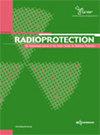Radiological protection challenges facing business activities affected by a nuclear accident: some lessons from the management of the accident at the Fukushima-Daiichi Nuclear Power Plant
IF 1.8
4区 医学
Q4 ENVIRONMENTAL SCIENCES
引用次数: 9
Abstract
Lessons from the Fukushima-Daiichi nuclear power plant accident emphasize the difficulties for restoring the socio-economic activities in the affected areas. Among them, a series of radioligical protection challenges were noted, in particular concerning the protection of employees, the securing of the production and the guarantee provided to consumers of the radiological monitoring of products to restore their confidence. Based on case studies reporting the experience of employers deploying their activities in affected areas, an analysis of these radiological protection challenges has been performed. Characterizing the radiological situation was not always straightforward for the managers. With the help of radiological protection experts, protective actions have been identified and specific efforts have been devoted to provide information to employees and their families helping them to make their own judgement about the radiological situation. Respecting the decisions of employees and developing a radiological protection culture among them have proved to be efficient for restoring the business activities. Continuing or restoring the production not always manageable. It requires to develop dedicated radiological monitoring processes to ensure the radiological protection of workers and the quality of the production. Re-establishing the link with the consumers and organising the vigilance on the long-term were necessary for companies to maintain their production or develop new ones. Deploying a socio-economic programme for ensuring the community resilience in affected areas requires the adoption of governance mechanisms respecting ethical values to ensure the overall objective of protecting people and the environment against the risks of ionizing radiation and contributing to provide decent living and working conditions to the affected communities. It is of primary importance to rely on the involvement of local communities in the elaboration and deployment of the socio-economic activities with due considerations for ensuring the integrity of the communities, and respecting their choices.受核事故影响的商业活动所面临的辐射防护挑战:来自福岛第一核电站事故管理的一些教训
福岛第一核电站事故的教训强调了在受影响地区恢复社会经济活动的困难。其中指出了一系列辐射保护方面的挑战,特别是关于保护雇员、确保生产和向消费者提供产品辐射监测以恢复他们信心的保证。根据报告雇主在受影响地区开展活动的经验的案例研究,对这些辐射防护挑战进行了分析。对管理人员来说,描述放射性状况并不总是直截了当的。在辐射防护专家的帮助下,已经确定了防护措施,并作出了具体努力,向雇员及其家属提供信息,帮助他们对辐射情况作出自己的判断。事实证明,尊重员工的决定和在员工中培养辐射防护文化对恢复业务活动是有效的。继续或恢复生产并不总是可控的。它要求制定专门的放射监测流程,以确保工人的放射防护和生产质量。重新建立与消费者的联系,组织长期的警惕,对于公司维持其生产或开发新产品是必要的。部署确保受影响地区社区复原力的社会经济方案需要采用尊重道德价值观的治理机制,以确保保护人民和环境免受电离辐射风险的总体目标,并有助于为受影响社区提供体面的生活和工作条件。最重要的是依靠当地社区参与制订和部署社会经济活动,并适当考虑到确保社区的完整和尊重他们的选择。
本文章由计算机程序翻译,如有差异,请以英文原文为准。
求助全文
约1分钟内获得全文
求助全文
来源期刊

Radioprotection
ENVIRONMENTAL SCIENCES-PUBLIC, ENVIRONMENTAL & OCCUPATIONAL HEALTH
CiteScore
3.30
自引率
54.50%
发文量
35
审稿时长
>12 weeks
期刊介绍:
Radioprotection publishes articles on all aspects of radiological protection, including non-ionising as well as ionising radiations. Fields of interest range from research, development and theory to operational matters, education and training. The very wide spectrum of its topics includes (theoretical and practical aspects): dosimetry, instrument development, specialized measuring techniques, epidemiology, biological effects (in vivo and in vitro) and risk and environmental impact assessments.
 求助内容:
求助内容: 应助结果提醒方式:
应助结果提醒方式:


